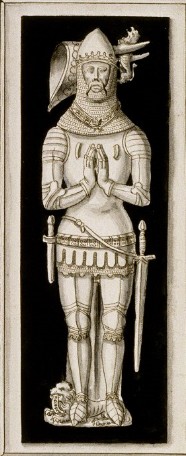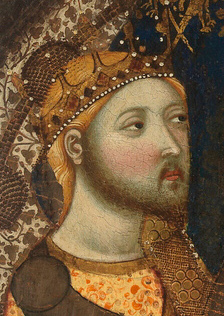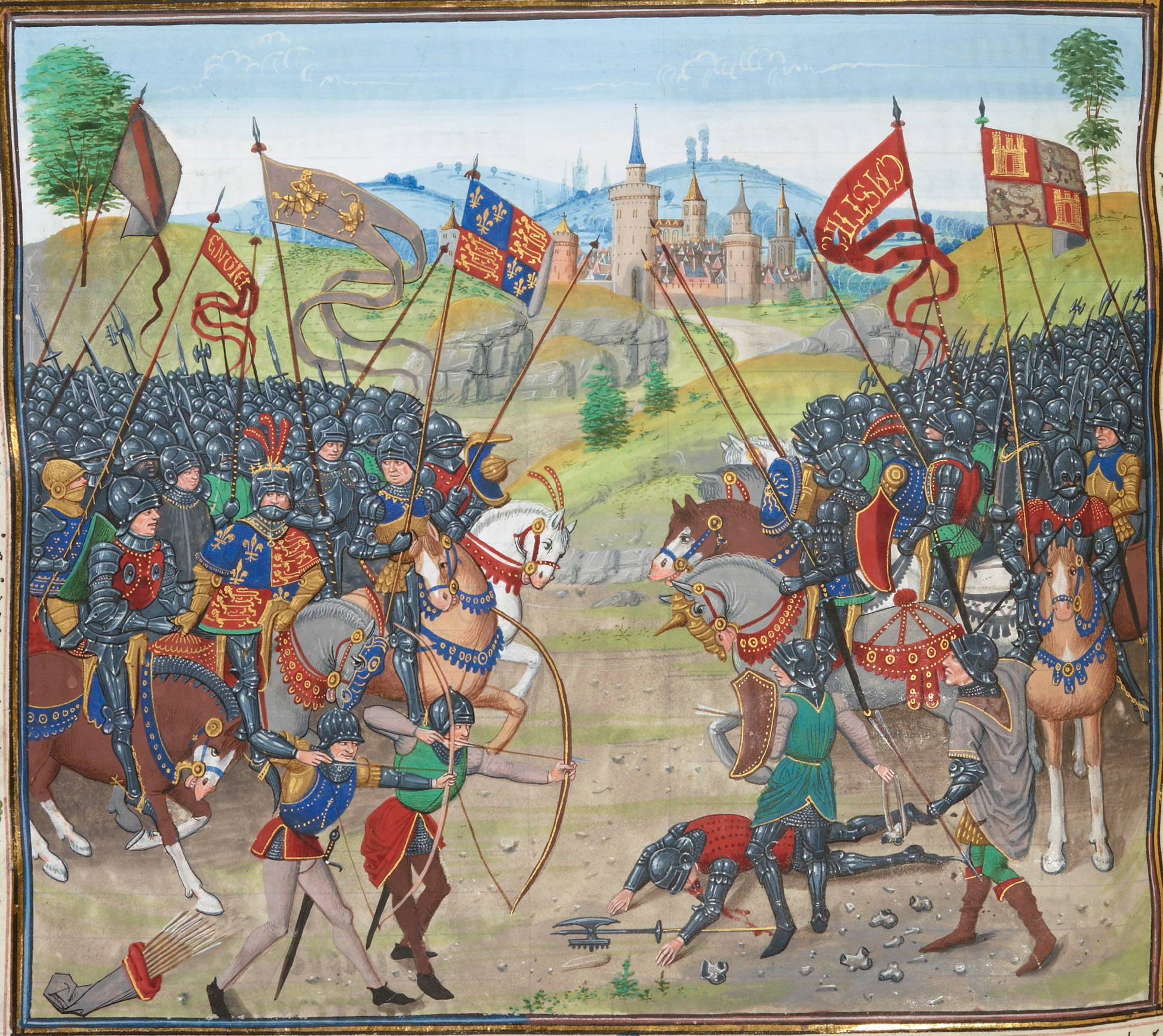Fighting over Burgundy
 |
| Philip the Bold |
By 1363
Bertrand was Captain General of Normandy. This rapid ascent had been made
possible by King Jean’s decision to take over the Duchy of Burgundy following
the death of its hereditary duke Philip in 1361. Jean made himself duke[i] and then two years later
handed the duchy over to his youngest son Philip.
At this
point King Jean discovered that Louis of Anjou, tiring of life as a hostage
awaiting payment of Jean’s ransom, had slipped away from his captors and
refused to return. Jean decided that the only honourable thing was to return to
captivity in England; he never returned, dying on 8th April 1364, to
be succeeded by Charles V.
The decision
to give the duchy of Burgundy to Philip provoked Charles of Navarre[ii] into outright hostility;
he considered the duchy his by right of primogeniture. Edward III looked the
other way while Charles allied with the Gascons and members of the Great Company[iii] to carry on the war against France
by proxy.
 |
| Battle of Cocherel |
On 13th
May 1364 the two sides clashed at the battle of Cocherel; the Captal de Buch[iv] leading the forces of Charles of
Navarre. The nobility and the captains all agreed with Froissart’s verdict that;
‘The best knight on the
field, who had fought the most with his own hand, and who knew best how such
things must be managed, was messire
Bertrand du Guesclin.’[v]
Bertrand’s
leadership brought victory to the French.
The End of the Civil War in Brittany
 |
| Jean de Montfort |
The struggle
for control of Brittany was now in its third decade. Jean, the current de Montfort claimant,
was the son of Count Jean[vi]. Jean laid siege to the
town of Auray and Charles of Blois sent Bertrand
and his men. Most of the French knights in Normandy were summonsed to defend
the town.
Bertrand was
divested of his captaincy of Normandy by Charles V in a show of neutrality in
the vexed Brittany dispute. The two sides lined up and at the battle of Auray, Bertrand fought with the Count of Auxerre and his brother
and Charles of Blois against an army that included such famous knights as Sir John Chandos[vii], Sir Robert Knolles and Sir Olivier de Clisson. Froissart informs us that Charles
of Blois[viii]
‘Disposed his battalions
according to the advice of my lord Bertran du Guesclin, who was one of the
principal captains there.’[ix]
The English
reserve under Sir Hugh Calveley, surprised the French rear; one of the many
French casualties was Charles of Blois[x]. Bertrand fell prisoner to
Olivier de Clisson. The de Montforts moved quickly to overcome any towns and
chateaux that remained loyal to Jeanne de Penthièvre. Charles V suggested to
Jeanne that she come to terms with her enemy; she retained her County of
Penthièvre and received a large cash indemnity. |
| Battle of Auray |
Bertrand and
his fellow prisoners were held at various strongholds in Poitou. Bertrand was
held at Niort and was paroled when Charles V
agreed to pay 40,000 gold florins for his ransom[xi]. Bertrand was not able to
take up arms again until May 1365, when he was redeemed. According to Froissart
the Pope, Charles V and Henry of Trastamare paid one third of his ransom each.
Spain
During the
peace between the English and the French following the Treaty of Brétigny, many
of the combatants travelled to Spain, fighting in the dispute over the crown of
Castile. The two candidates were Pedro the Cruel[xii], supported by the Black Prince and
his troops, and Pedro’s bastard half brother, Henry of Trastamare[xiii]. Henry was supported by
the French led by du Guesclin. _01.jpg) |
| Pedro the Cruel |
Pedro had
already been married twice, the second time in 1353 to Blanche of Bourbon[xiv]. This second marriage was bigamous
and Pedro immediately deserted Blanche, returning to his legal wife. Blanche
was imprisoned at Arevalo for which slight Jean II of France
demanded Pope Innocent VI have Pedro excommunicated; Innocent
ignored this demand. From 1356-66 Pedro was involved in a war with Aragon with his English allies.
Blanche died
in 1361 and it was rumoured that Pedro had her murdered, allegedly upset
because her dowry had not been paid. Furthermore the rumour was set about that
the Jews had instigated the queen’s murder, which gave Henry the chance to tap
into popular anti-Semitism. Pedro’s treatment of his nobility set him on a
crash trajectory with them; like many other medieval rulers Pedro aimed to
consolidate the power of the crown at the expense of the feudal nobility. To
that end he had a number of them killed
Pedro’s rule
suffered a brief hiatus in 1366-7 when Henry, supported by French troops led by
du Guesclin, took the throne from Pedro[xv], Pedro fled Castile on 28th
March 1366 and in the ensuing celebrations Bertrand was made Duke of Trastamare
by the new king of Castile.
 |
| Henry of Trastamare |
Henry
retained a number of the mercenaries in his service including;
‘Mossen Bertran de Claquin
and the Bretons of his company, Mossen Hugo de Calviley, and some Englishmen,
in all, foreign companies numbering 1,500 lances[xvi].’[xvii]
At the end
of the summer Henry moved against a supporter of Pedro’s and besieged the
walled town of Lugo[xviii]. It is believed that Henry used his
retained mercenaries including Bertrand to undertake the siege, although there
is no record of this. The siege came to nothing as on 23rd September Pedro signed Treaty of Libourne, an alliance with the Black Prince and the King of Navarre. Pedro promised to pay 500,000 gold florins[xix] and give the Black Prince the fief of Biscay; in addition the prince’s supporters were to also receive large sums of money. The alliance between France and Castile threatened communications between England and Aquitaine. This was a blow to Henry’s hopes of retaining his newly won crown.
 |
| Battle of Najera |
Pedro’s
throne was regained at the Battle of Nájera[xx] fought on 3rd April. Bertrand’s reluctance
to face the English was apparently overruled and he was taken captive. Pedro’s
promise to pay the English enormous sums of money was renewed on 2nd
May in a treaty signed in Burgos. He departed to raise the sums in question,
promising to meet the Black Prince and his entourage at Valladolid. The English
waited in vain. Famine struck the waiting army and the Black Prince seized
several towns and allowed his soldiers to rampage across the countryside to forage for food.
Around 25th
June the Black Prince sent Pedro a reminder of his obligations under the
treaty. He was informed that while the companies roamed through Castile Pedro
was unable to raise the required monies. The Spanish climate was taking its
toll on the English soldiers and the Black Prince himself appears to have
picked up dysentery which then gave way to dropsy[xxi].
 |
| Joanna of Naples |
According to
Froissart Bertrand’s ransom of 100,000 francs[xxii] was paid by Charles V
and the Duke of Anjou.
‘The prince [Edward], on
hearing these words, thought sir Bertrand had spoken them with such good sense;
for in truth, his council were unwilling he should have his liberty, until don
Pedro had paid to the prince and his army the money he had engaged to do: he
answered, "What, sir Bertrand, do you imagine that we keep you a prisoner
for fear of your prowess? By St. George, it is not so; for my good sir, if you
will pay one hundred thousand francs, you shall be free."’[xxiii]
Bertrand
then fought for the Duke of Anjou in his war against Queen Joanna of Naples.
Bibliography
Edward III –
Bryan Bevan, The Rubicon Press 1992
The Hundred
Years War – Alfred Burne, Folio Society 2005
Chronicles –
Froissart, Penguin Books Ltd 1968
Edward III –
WM Ormrod, Tempus Publishing Ltd 2005
The Monks of
War – Desmond Seward, Folio Society 2000
A Distant
Mirror – Barbara Tuchman, Pan MacMillan Publishers Ltd 1989
The Flower
of Chivalry – Richard Vernier, The Boydell Press 2003
www.wikipedia.en
[i]
Philip was a nephew of the Queen of France
[ii]
He was a grandson of Louis
X, brother of the dowager Queen and Jean’s son-in-law. Charles had already
got away with murder of a Constable of France Charles d’Espagne;
not to mention his involvement in the Jacquerie and a number of other murders.
Charles was a vassal of both Edward and Jean
[iii]
Formed from soldiers left without means of support after the Treaty of Brétigny
[iv]
Considered by Froissart as epitomising the ideals of chivalry
[v]
The Flower of Chivalry - Vernier
[vi]
Who died in 1345
[vii]
Constable of Aquitaine and a close friend of the Black Prince. His herald,
known as Chandos Herald,
was the author of a poem about the exploits of the Black Prince.
[viii]
In overall control of the Breton army
[ix]
The Flower of Chivalry - Vernier
[x]
There were over 1,000 French dead and 1,500 prisoners, a list that included
Bertrand’s brother Olivier and the Count of Auxerre.
[xi]
Worth in 2011 £20,700,000.00
using the retail price index or £275,000,000.00
using average earnings www.measuringworth.com
[xii]
The name was probably foisted on him by his successor
[xiii]
Henry revolted against Peter on several occasions and fought for the King of
Aragon against his brother
[xiv]
In whose trousseau 11,794 squirrel skins were used, mostly imported from
Scandinavia
[xv]
Peter fled and appealed to the Black Prince for aid; while in exile he ordered
the murder of Suero, the Archbishop of Santiago and his Dean
[xvi]
4,500 men in all – a lance was made up of three men.
[xvii]
The Flower of Chivalry - Vernier
[xviii]
In Galicia
[xix]
In 2011 worth £299,000,000.00
using the retail price index £3,350,000,000.00
using average earnings www.measuringworth.com
[xx]
Bertrand’s Dukedom of Trastamara was taken from him at some point after Pedro’s
restoration
[xxi]
Accumulation of fluid under the skin and in cavities of the body including the
lungs
[xxii]
In 2011 worth £58,400,000.00
using the retail price index or £680,000,000.00
using average earnings www.measuringworth.com
No comments:
Post a Comment
Note: only a member of this blog may post a comment.